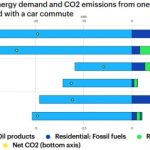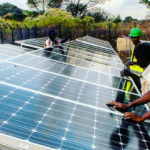After good progress globally since 2015, basic energy access reversed in recent years for the first time in a decade, says the IEA. The 2024 edition of “Tracking SDG 7: The Energy Progress Report” measures progress on “strategic development goals” that include universal access to electricity and clean cooking, doubling historic levels of efficiency improvements, and substantially increasing the share of renewables in the global energy mix. The … [Read more...]
The link between global GDP growth and CO2 emissions is weakening rapidly. Will emissions peak well before 2030?
Economic growth has been closely tied to rising greenhouse gas emissions since the industrial age. But data now clearly shows that that GDP growth and CO2 emissions are diverging. Siddharth Singh at the IEA presents the numbers. In advanced economies that divergence now seems locked in, with 2007 marking the moment of peak emissions (and not simply because of offshoring manufacturing). Even in developing economies GDP growth is far outpacing … [Read more...]
Nearly 2,000 Hydrogen projects worldwide: IEA’s interactive tools give snapshot on progress, costs
The IEA has released new interactive data tools to track the development of low-emissions hydrogen production around the world. They provide a snapshot of progress on hydrogen production, with data on almost 2,000 projects that are either already in operation or have been announced. Most projects to date are concentrated in Europe and Australia, with a growing number planned in Africa, China, India, Latin America and the U.S. One of the tools … [Read more...]
Middle East & Africa to export Hydrogen to Europe? Better to make green Iron & Steel and export that
The MENA region (Middle East and North Africa) is well suited to making green hydrogen. There’s huge potential for powering green hydrogen production with cheap solar. And Europe wants to import it. But Soroush Basirat and Simon Nicholas at IEEFA argue that MENA should use the green hydrogen to make green iron and steel and export that. It already has an established direct reduced iron (DRI) sector: now powered by gas which can be swapped out for … [Read more...]
Concrete: 8% of global emissions and rising. Which innovations can achieve net zero by 2050?
Concrete manufacture is responsible for 8% of global carbon emissions, with the ingredient “clinker” accounting for most of it. Global demand for cement (which hardens into concrete) is expected to increase 48% from 4.2bn to 6.2bn tons by 2050, mainly driven by developing nations. China used more concrete between 2011 and 2013 than the United States did in the entire 20th century. Ben Skinner and Radhika Lalit at RMI look at the materials and … [Read more...]
$78tn net gain for compensated global Coal phase-out, when social benefits are added
Is replacing coal with renewables too expensive? No, it’s the opposite, explain Tobias Adrian at the International Monetary Fund, Patrick Bolton at Imperial College London and Alissa Kleinnijenhuis at the Oxford Martin School who summarise their paper. When the social benefits are added, the net gain globally is around $78tn under a conservative estimate. That’s equal to 1.2% of current world GDP every year until 2100 – these are real economic … [Read more...]
Eradicate global poverty, meet climate goals, by avoiding rich-world energy consumption patterns
There is concern that eradicating poverty in the global south means their growing wealth and energy consumption will make our climate targets too hard to meet. Here, Jarmo Kikstra and Narasimha Rao, writing for Carbon Brief, explain that the energy needed to eradicate poverty is compatible with climate goals, provided that policymakers focus on delivering decent living standards, and not copying the affluence and habits of rich countries. Most … [Read more...]
Covid-19: want to vaccinate 75% of the world? Developing nations need small-scale Solar refrigeration first
The flexibility of small scale solar can help roll out vaccines to remote and poorer parts of the world that the grid doesn’t reach. Access to power for refrigeration is vital when you consider that most vaccines must be stored between 2°C and 8°C, like for measles and polio. It’s the same for the Covid-19 vaccines from Johnson & Johnson and AstraZeneca-Oxford. But the Moderna vaccine must be stored at between -25°C and -15°C. The … [Read more...]
Germany’s plans to be a Hydrogen leader: producer, consumer, solutions provider
Germany is getting in early on the proposed hydrogen economy as a producer, consumer and with intentions to be the leading international supplier of hydrogen technologies. Simon Göss at Energy Brainpool runs through the main drivers for hydrogen before summarising the German strategy. The German 2030 target is to have electrolyser capacity of 5GW installed to produce 14TWh of green hydrogen, providing 15% of the hydrogen consumed in Germany by … [Read more...]
Calculating the energy saved if home working becomes the norm, globally
The global lockdown has resulted in a jump in home working and a collapse in commuting. If, post-lockdown, this new lifestyle is widely embraced, will it mean a reduction in total energy consumption and, if so, by how much? Daniel Crow and Ariane Millot at the IEA have crunched the numbers to attempt to answer this question. The first observation is that although car use will drop, residential energy consumption will rise. This is what makes the … [Read more...]
Africa and renewables: the international partnerships bringing 300GW potential to life
Gaining access to energy is vital for Africa's people and national economies so tapping their vast potential for renewables is the obvious solution both for them and the climate. The challenge, as ever, is funding. To solve this, African nations are striking up international partnerships in a bid to unleash the full power of their phenomenal natural assets. … [Read more...]
Desert solar – the race for the world’s biggest farm
When solar power was first conceived decades ago, the obvious locations for the farms were the world’s great deserts. Sure enough, the biggest farms are being built there reports Arasan Aruliah. … [Read more...]
Report maps out the new geopolitical power dynamics created by renewables
A new report by the Global Commission on the Geopolitics of Energy Transformation says the new energy age will profoundly reshape relations between states and regions. It will bring “A New World” of power, security, energy independence and prosperity. It will also reshape the geopolitical map, just as fossil-fuels have done over the last 200 years. No nation will be unaffected. … [Read more...]
Renewables losing market share in Africa
Alarming new data shows that coal, liquid fuels and gas are strengthening their grip on Africa’s power sector. Investments in renewables are too slow to keep pace with demand growth. With the ink still drying on Katowice's COP24 agreement, Terje Osmundsen's latest blog post makes for urgent reading... … [Read more...]















